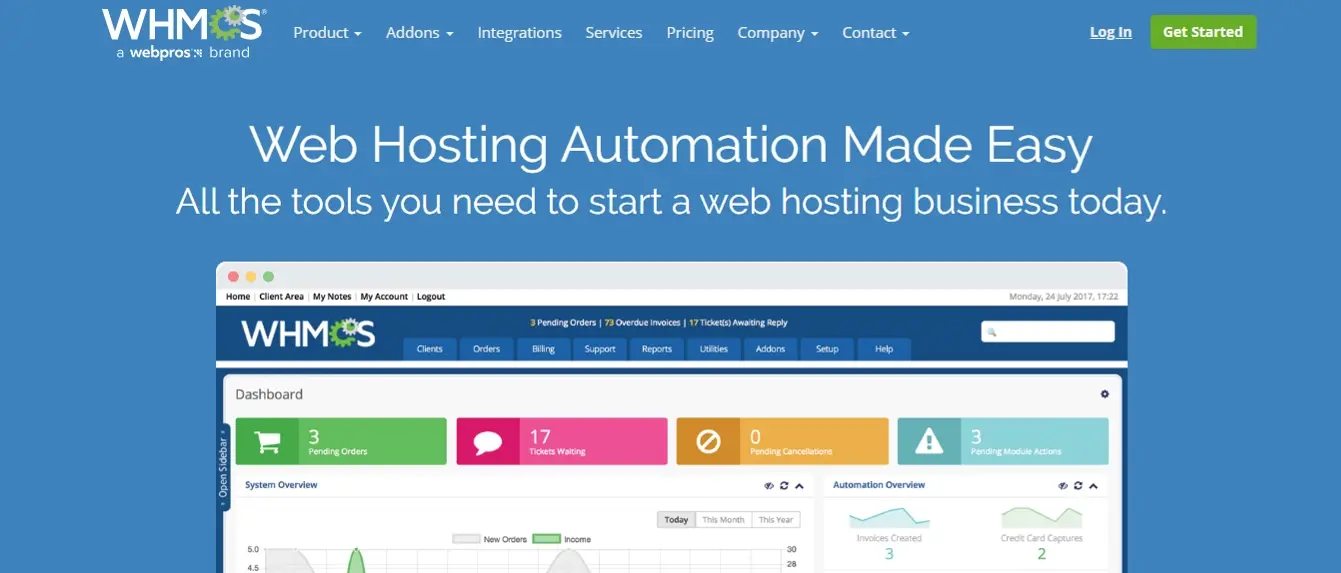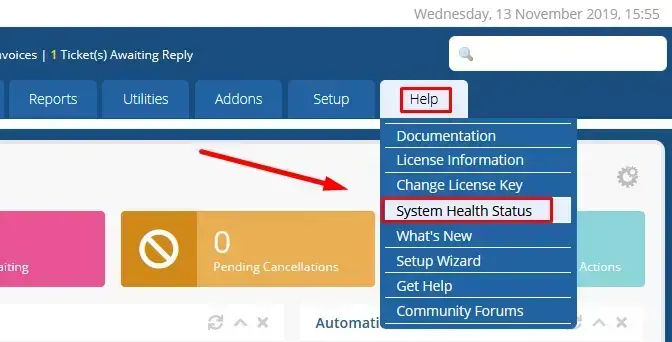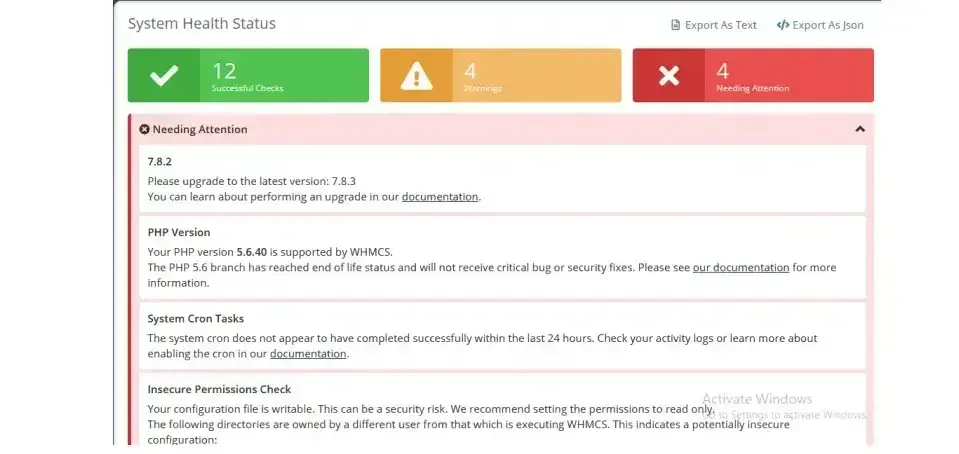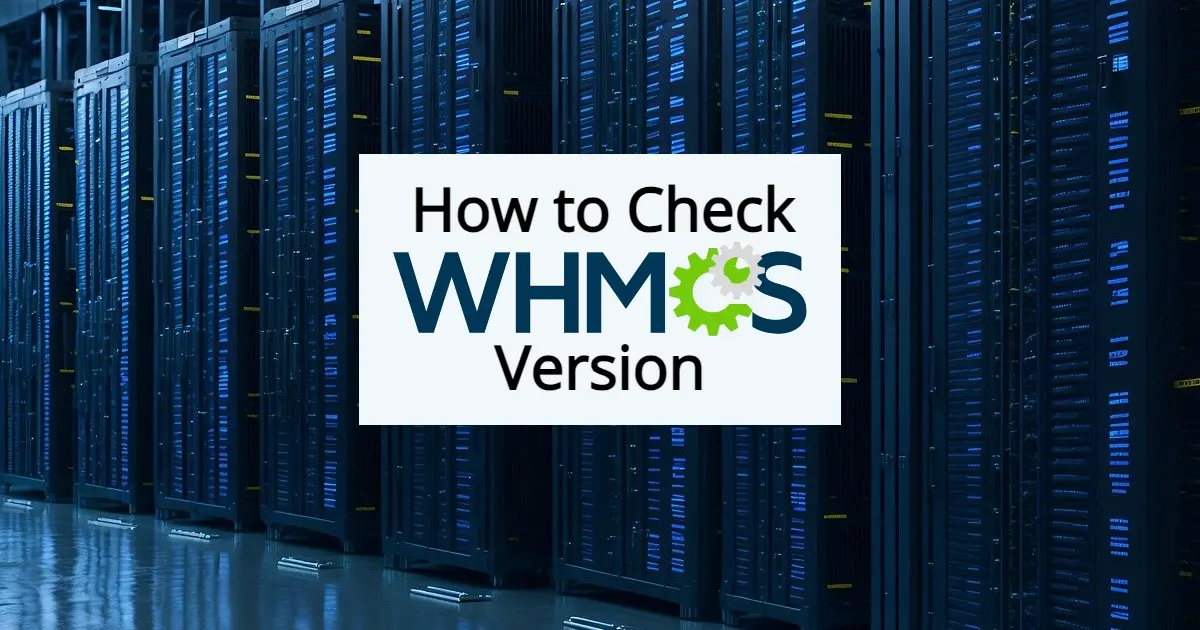Are you using WHMCS? Ever wonder if you’re on the most up-to-date version. In this article, you’ll learn a bit about WHMCS and even how to check WHMCS version.
What is WHMCS?

WHMCS stands for Web Hosting Management Complete Solution. It's a comprehensive software platform designed to help web hosting businesses manage their clients, billing, and automation processes.
This is a great solution if you’re wanting to make money doing reseller hosting.
Key Features of WHMCS
Here are 12 key features offered by WHMCS:
- Client Management
- Billing and Invoicing
- Domain Management
- Support Ticket System
- Product/Service Catalog
- Automation and Provisioning
- Customization and Branding
- Reporting and Analytics
- Security
- Integrations
- Knowledge Base
- API and Developer Tools
Client Management
WHMCS provides a robust client management system that allows you to easily add, edit, and manage client profiles. You can track client information, payment history, service usage, and more.
Billing and Invoicing
WHMCS automates the billing process, generating invoices, processing payments, and managing recurring billing cycles. It supports a wide range of payment gateways, including PayPal, Stripe, and Authorize.Net.
Domain Management
WHMCS integrates with popular domain registrars, enabling you to register, renew, and transfer domains directly from your WHMCS dashboard. You can also manage domain DNS records and WHOIS information.
Support Ticket System
WHMCS includes a powerful support ticket system that allows clients to submit support tickets and track their progress. You can assign tickets to staff members, categorize them, and respond to clients efficiently.
Product/Service Catalog
Create and manage a comprehensive product and service catalog, including hosting packages, domain names, and other digital products. You can define pricing, provisioning rules, and service terms.
Automation and Provisioning
WHMCS automates the provisioning of services, such as creating hosting accounts, configuring DNS records, and assigning resources. This saves time and reduces manual errors.
Customization and Branding
Customize the look and feel of your WHMCS portal to match your brand identity. You can modify templates, add custom fields, and create custom modules to tailor the platform to your specific needs.
Reporting and Analytics
Generate detailed reports on sales, revenue, customer activity, and other key metrics. Analyze these reports to gain valuable insights into your business performance.
Security
WHMCS employs robust security measures to protect your data and your clients' information. These include encryption, access controls, and regular security updates.
Integrations
WHMCS integrates with a wide range of third-party services and applications, including control panels (cPanel, Plesk), payment gateways, and other tools.
Knowledge Base
Create and manage a knowledge base to provide self-service support to your clients. You can organize articles into categories, add search functionality, and allow clients to search for solutions to common problems.
API and Developer Tools
WHMCS offers a powerful API that allows you to extend its functionality and integrate it with other systems. You can develop custom modules, scripts, and integrations to automate tasks and streamline workflows.
Why would you need to check your WHMCS version?
Here are 5 detailed reasons why you might need to check your WHMCS version:
- Security Updates
- Feature Compatibility
- Performance Optimization
- Bug Fixes
- Support and Maintenance
Security Updates
WHMCS could release some important security updates like:
- Vulnerabilities
- Patch Releases
- Risk Mitigation
Vulnerabilities
Older versions of WHMCS might have known security vulnerabilities that can be exploited by malicious actors.
Patch Releases
Regular updates often include security patches to address these vulnerabilities.
Risk Mitigation
Checking your version and updating to the latest release can help mitigate security risks.
Feature Compatibility
Some feature compatibilities in WHMCS are:
- New Features
- Plugin Compatibility
- Feature Access
New Features
Newer versions of WHMCS often introduce new features and functionalities.
Plugin Compatibility
Some plugins and modules might require specific WHMCS versions to work correctly.
Feature Access
Checking your version can help you determine if you have access to the latest features and functionalities.
Performance Optimization
A few areas in WHMCS on performance optimization are:
- Performance Improvements
- Resource Usage
- Efficiency
Performance Improvements
Newer versions often include performance optimizations that can improve the speed and responsiveness of your WHMCS installation.
Resource Usage
Older versions might consume more server resources, leading to slower performance.
Efficiency
Updating to the latest version can help you optimize resource usage and improve overall performance.
Bug Fixes
Bug fixes in WHMCS usually fall under
- Known Issues
- Stability
- Smooth Operations
Known Issues
Older versions might have known bugs and issues that can affect the functionality of your WHMCS installation.
Stability
Regular updates often include bug fixes that improve the stability and reliability of the software.
Smooth Operations
Checking your version and updating can help you avoid potential issues and ensure smooth operations.
Support and Maintenance
Support maintenance in WHMCS usually includes:
- Official Support
- Community Support
- Future Updates
Official Support
WHMCS provides official support for the latest versions of the software.
Community Support
The WHMCS community is more active in providing support for the latest versions.
Future Updates
Checking your version can help you determine if you are eligible for future updates and support.
How to Check WHMCS Version
Here are 3 step-by-step guides on how to check your WHMCS version:
- Checking from within the WHMCS Admin Area
- Checking the Database
- Checking PHP Files (Less Recommended)
Method 1: Checking from within the WHMCS Admin Area
- Log in
- Navigate to Systems Settings
- Find System Information
- Locate the Version
Log in
Access your WHMCS admin area by going to your domain name followed by /admin (e.g., https://yourdomain.com/admin).
Navigate to System Settings

Once logged in, look for a "System Settings" or "Utilities" section in the main menu.
Find System Information

Within the System Settings, you should find a section labeled "System Information" or something similar.
Locate the Version
Look for the "WHMCS Version" entry in the System Information section. The current version number will be displayed next to it.
Method 2: Checking the Database
- Access Your Database
- Locate the
tblconfigurationTable - Search for the Version
Access Your Database
Use a database management tool like phpMyAdmin to access your WHMCS database.
Locate the tblconfiguration Table
Find the table named tblconfiguration.
Search for the Version
In this table, look for a row with the field name "Version." The value in this field is your WHMCS version.
Method 3: Checking PHP Files (Less Recommended)
- Access Your WHMCS Files
- Open a PHP File
- Look for the Version Comment
Access Your WHMCS Files
Use an FTP client or your hosting control panel to access your WHMCS files.
Open a PHP File
Open any PHP file within your WHMCS installation.
Look for the Version Comment
At the top of the file, you might find a comment that indicates the WHMCS version.
Out of all of these methods, method 1 is generally the easiest and most reliable way to check your WHMCS version. Method 2 is useful if you cannot access the WHMCS admin area. Method 3 is less recommended as it might not always be accurate.
In Summary
Hopefully this article has helped you understand WHMCS better, and allow you to successfully check WHMCS version. In doing so, you’ll keep your billing and invoicing secure, as well as keep your reseller web hosting clients happy. Happy hosting!
Frequently Asked Questions
Do you provide WHMCS?
We don't provide WHMCS but our hosting is fully compatible with it. You can purchase a license directly from the developers and use your Verpex WHM reseller details to automate hosting setup and billing.
Does WHMCS offer hosting?
No, WHMCS is not a web hosting provider and does not offer hosting services. Instead, it is a web hosting automation and billing platform that is designed to help web hosting providers, including reseller hosting providers, manage their businesses more efficiently.
Can I customise the WHMCS interface?
Yes, you can customise the WHMCS interface to match your branding and website design. WHMCS includes a variety of customization options, including the ability to add your logo, change colours, and add custom pages.
How much does reseller hosting with WHMCS cost?
The cost of reseller hosting with WHMCS can vary depending on the hosting provider you choose and the features included in your plan. Typically, reseller hosting plans start at around $10 to $20 per month and can go up to several hundred dollars per month for larger plans with more resources.

Nile Flores is a long time professional blogger, as well as WordPress website designer and developer from the St. Louis Metro East. Nile blogs at NileFlores.com, where she’s passionate about helping website owners, whether they’re small business owners or bloggers. She teaches about Blogging, Social Media, Search Engine Optimization, Website Design, and WordPress. Additionally, Nile loves to speak at WordCamps (WordPress conferences) across the United States. When Nile isn’t knee-deep in coding, she’s a proud mom of a college student, and enjoys oil painting, cigar smoking, nail art design, and practicing traditional Okinawan kempo karate.
View all posts by Nile Flores




















